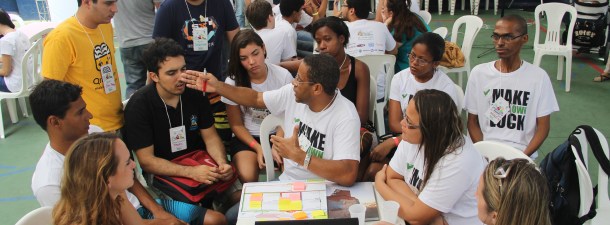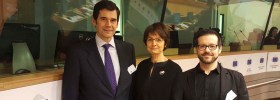This is the second in a series of four striking examples of #TechforGood, and part of our video campaign (watch here) where we called for people to nominate inspiring initiatives of tech being used for wider social impact.
 Marcel Fukayama (@mfukayama) of CDI Global and Eleanor Murphy of CDI Apps for Good are both working in a network with a very clear mission: to harness the power of technology to fight poverty and stimulate entrepreneurship in some of the most challenging communities. Marcel, Global CEO and a serial entrepreneur himself told us about CDI’s goal to democratize the internet in Latin America whilst Eleanor filled us in on the Apps for Good programme which is operating in the UK and exploring international opportunities.
Marcel Fukayama (@mfukayama) of CDI Global and Eleanor Murphy of CDI Apps for Good are both working in a network with a very clear mission: to harness the power of technology to fight poverty and stimulate entrepreneurship in some of the most challenging communities. Marcel, Global CEO and a serial entrepreneur himself told us about CDI’s goal to democratize the internet in Latin America whilst Eleanor filled us in on the Apps for Good programme which is operating in the UK and exploring international opportunities.
We sat down with Marcel and Eleanor to find out more about the ins and outs of their work.
Where does your inspiration for being a social entrepreneur come from?
Marcel: I’ve always had a passion for technology and entrepreneurship. Tech is the most powerful resource we have because it really can empower people in developing communities to transform their lives. I started using a computer when I was 9 years old and suddenly I had this new and incredible window to the world. It saddened me that Internet access in Brazil was restricted to high-income families so I decided that I wanted to democratize the Internet. It was this ambition underpinned by technology that enabled me to set up my first Internet café, and is what our Digital Inclusion Program is all about today.
What is CDI’s mission and how does your organization and network set out to achieve it?
Marcel: Our organisation and network focuses on three different areas: social engagement, education and social entrepreneurship. We get out into low-income communities and teach 21st century skills like IT, programming and problem-solving so that every single one of our students is equipped to be a change-maker.
In Latin America we’re seeing the number of mobile connections growing rapidly and right now there are more cellphones in Brazil than there are people. Most of our students only have Internet access at their school or at work (if at all) so we are looking to exploit these exciting new mobile technology trends using local community centers to reach these people.
In terms of education, our CDI School project has seen some really tangible results. We now have 19th century classrooms, 20th century staff and 21st century pupils. We want to solve the problem that most teachers are out of touch with the emerging technologies which so desperately need to be applied. Before we started training teachers in tech, half of the students were below the line deemed acceptable by the Sao Paulo education department. Since the pilot, 16% of those same students are now exceeding the advanced level, which is a huge step up.
Does CDI Apps for Good in the UK take a very different approach?
Eleanor: Back in 2009, when CDI established in the UK, the feasibility study conducted for us demonstrated that the tech tools required in the UK were very different from the ones used across the Latin American network. The findings of the study recommended focusing on apps rather than more traditional hardware.

We’re disrupting the traditional model of the teacher being “the fountain of all knowledge” at the front of the classroom by using a holistic approach which encourages young people to get into tech by incorporating added components to STEM learning. We take a lean start-up approach, applying STEAMED learning which includes art, drama and entrepreneurship. We highly value our students’ ideas and aim to engage different players in developing them. Our ethos and approach has supported a significant shift in the delivery of our course, which used to be primarily on offer in after school clubs, but is now mainstream with the majority taught during timetabled classes.
Has the Apps for Good programme had any particular successes? Are your students actually going on to work in tech?
Eleanor: There have been several apps created by our students which have made some noise in the UK. Amongst the first to be developed, the “Stop and Search” app aims to give the public a way to hold the police more accountable by logging the number of stops across the country. It was created by a group of students we worked with in South London who had direct experience of being stopped and searched.
More recently, another group of students in rural Scotland also developed “Cattle Manager” to deal with the challenges the local farming communities, including their families, face working in agriculture. To date, the app has been downloaded over 2,500 times, looking to save time and energy on herd management paperwork.
Engaging girls in tech has also been a significant achievement of our programme, and we’ve seen some great examples. A student called Amarah and her team created an app called Buzzer Buddiez, a fun alarm clock that texts your friends to make sure you get out of bed on time. Another young student called Mohima developed Transit, an English to Bengali translator, and is now in her first year of an engineering degree at Imperial College London.
[youtube]https://www.youtube.com/watch?v=duFZSri-My8[/youtube]
Across the classes that are delivering our programme, we have achieved a near 50/50 balance of boys and girls in the past couple of years, and we’re proud to be providing them with a broad education by harnessing the power of tech.
Just how powerful is tech as a catalyst for social good? Is there still a long way to go?
Marcel: For me there is one example in particular which demonstrates the power of tech as a driver for social change. Back in March, several of our community leaders ran Startup Weekend Rio Favela. The 54-hour event focused on dealing with the biggest and most relevant problems in those areas such as education, waste disposal, income generation and culture. We mobilized a community of designers, investors and developers prototyping solutions in Morro do Providência.
The idea of a 71 year-old was selected over 30 other ideas to be developed by our team. His disruptive prototype established 17 medical protocols to help diagnose chronic disease in favelas via a mobile app. He had noticed that when people were ill in his slum, they often didn’t have the resources or time to get to a doctor to have a proper diagnosis. His idea dealt with that problem.
Tech is a very powerful tool that is undoubtedly triggering social change – but there is still a long way to go. I would like to see more investment in the Internet of Things and Machine Learning. There is a big future for these technologies.
What are the challenges and frustrations you face as an organization?
Marcel: Right now we are working hard to solve local challenges in all of the countries we work in. However, we realize that they aren’t just local, they are global – or rather “glocal” as we like to call them. The fact that all slums have the same problems presents a challenge to us: how do we engage multiple stakeholders in such a complex ecosystem to find solutions?
We’ve just set up the CDI Affiliate program as our next step to bring together all tech for good organizations to find new ways to cooperate. We’re working hard to form a global alliance and so far we have 25 organizations across 9 countries onboard. There’s still a long way to go but I believe in the power of tech and I’m excited about the future of CDI.
Interested in the work of CDI Apps for Good? The Apps for Good 2014 awards will take place at the Barbican in London on 23 June where young people from across the UK will have a chance to pitch to Baroness Martha Lane Fox, Gerard Grech, and Simon Devonshire, our Director of New Business Ventures for Wayra Europe, among others.


![[Guest Post] Is this the end of smart devices?](https://en.blogthinkbig.com/wp-content/uploads/sites/5/2014/06/shutterstock_942461681.jpg?resize=p%2Co)






